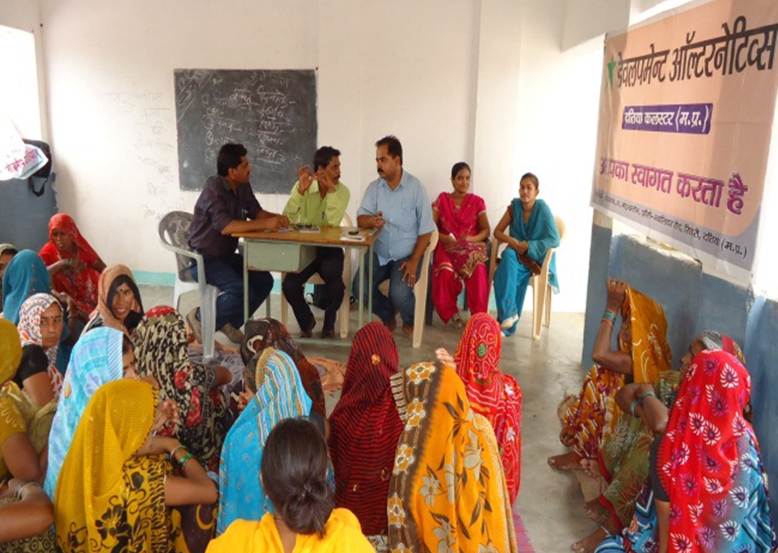|
Self Help
Groups – An Effective Medium for
D espite the many affirmations ensuring women’s rights, women in India are vulnerable and face massive discrimination. In spite of its impressive economic growth, India fairs 129th out of 146 in the Gender Equality Index. The condition of rural women is worse as they are poor, illiterate, have limited access to health services and are not aware of their rights. Moreover, most of these women are unemployed and have no control over economic resources. They are burdened with domestic chores and inflicted with violence. These women are ‘voiceless’ and are not allowed to be a part of the decision-making processes in the domestic and the public sphere, leaving them completely disempowered.
The Government of India has facilitated the promotion and development of Self Help Groups (SHGs) as the marginalised and poor women lack assets that help contribute to their empowerment and well being. These self help groups comprise of 10-20 mostly poor rural women from the same village, who come together to contribute in bi-weekly or monthly dues as savings and provide group loans to their members. SHGs are generally facilitated by NGOs, and increasingly advise and train members in a variety of on and off-farm income generating activities. The International Fund for Agriculture Development reports that women self help groups are an effective means of improving the lives of the poor as they help to build social capital and community development processes. Development Alternatives (DA) has been working closely with women self-help groups for over a decade now. It works with these women groups to help improve their access to formal credit and livelihoods as well as create awareness to enable them avail their rights, entitlements and opportunities. The goal is to help these women achieve social, economic and political empowerment. Tejaswini project Supported by the International Fund for Agriculture Development (IFAD), the prime objective of this project is to enable poor women to have a wider range of choices and opportunities in the economic, social and political spheres so they can improve their own well being as well as that of their households. The word ‘Tejaswini’ implies capability and radiance. The Tejaswini Project is being implemented in six districts of Madhya Pradesh, namely, Panna, Chattarpur and Tikamgarh that are characterised by a high degree of gender inequality and Dindori, Mandla and Balaghat, that are characterised by high incidences of poverty and a large tribal population. The project supports and strengthens women’s self-help groups and their apex organisations, and provides them with access to financial services, fostering linkages with banks and supporting microfinance institutions. It also works to improve livelihood opportunities by developing participants’ skills, fostering market linkages and providing market and policy support. It provides access to functional literacy and labour-saving infrastructure and strengthens women’s participation in local governance. It also supports government policies that empower women and helps develop capacities of executing agencies. Strong and sustainable community institutions Development Alternatives works closely with 421 SHGs under this project. Initially, it was very difficult work to mobilise the women and community members but the commitment of the team helped overcome this crisis. The team organised village-level committees providing information about government sponsored schemes and enabling access to entitlements. These communities thus became interested in coming together and interacting with each other to solve their common problems. This allowed the formation and development of SHGs. Presently, DA has formed 421 Women Self Help Groups (WSHG) at their two location offices and these have accrued a saving amount of INR 43,12,076. The SHGs’ total inter-loaning amount is INR 38,16,397 and the recovery amount is INR 25,00,195. Micro finance services Micro finance services are a very important component of this project. SHGs are trained with the help of intra-group savings and lendings. The groups have been trained for use of the SHG fund to strengthen their on-going activities. These SHGs have been linked to banks and various micro finance institutions. Training support for more effective micro finance services have been organised at the district level by the district programme units. Livelihood and entrepreneurship development Under the Tejaswini project, efforts have been continuously made to enhance livelihood opportunity for the women associated with the SHGs. Training on identification of livelihood opportunities on the basis of available local resources has been carried out. Most of the women associated with the SHGs have enhanced their agricultural productivity by adopting newer forms of technology and high yield good quality seeds. They have also set up small enterprises such as food processing, grocery shops, barber shops, candle making activities and cycle repair shops. Women empowerment and social justice This component of the Tejaswini project addresses the issue of gender empowerment. Under this component, sensitisation has been conducted for SHG women, members of village panchayats, government line department officials and male members of the community through radio and TV programmes. The women are made aware of their rights and entitlements. Clean energy and technology solutions for agriculture have also been provided so as to reduce the drudgery of these women. q Rajesh Shrivastava
|